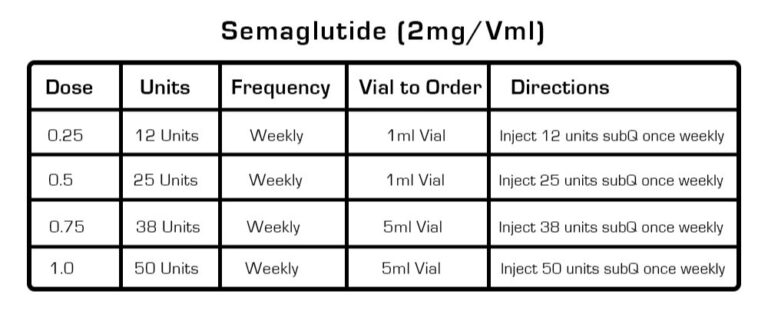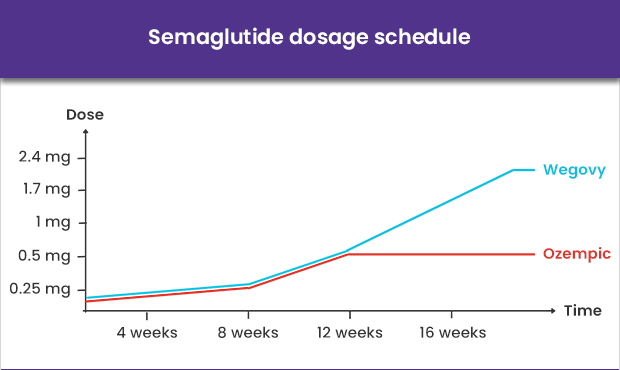Semaglutide has emerged as a revolutionary treatment for weight loss, providing significant results for those struggling with obesity and weight management. This article delves into the latest updates on semaglutide, explores what happened in its development, the role of video viral trends, insights from leak videos, and provides a detailed semaglutide weight loss dosage chart to help users understand its proper use.
The Latest Update: Semaglutide’s Efficacy in Weight Loss

Breakthroughs in Weight Management
The latest update in the realm of weight loss treatments highlights the efficacy of semaglutide, a GLP-1 receptor agonist. Clinical trials and real-world applications have shown significant weight loss results, making it a promising option for those struggling with obesity.
Approval and Popularity
Semaglutide has received FDA approval for weight loss, marketed under the brand names Wegovy and Ozempic. Its popularity continues to rise due to its effectiveness in reducing body weight and improving metabolic health.
What Happened: The Journey of Semaglutide

Development and Trials
What happened to bring semaglutide into the spotlight? Developed initially for managing type 2 diabetes, researchers discovered its potent effects on weight loss during clinical trials. This discovery led to further studies and eventually, its approval for weight loss.
Mechanism of Action
Semaglutide works by mimicking the GLP-1 hormone, which regulates appetite and food intake. By enhancing the feeling of fullness and reducing hunger, it helps users consume fewer calories, leading to weight loss.
Video Viral: Social Media Influence

Sharing Success Stories
Video viral content featuring semaglutide weight loss transformations has gained immense popularity on social media platforms. Success stories shared through videos inspire others to consider semaglutide as a viable option for weight management.
Public Support and Awareness
These viral videos have not only increased awareness about semaglutide but also garnered significant public support. Users share their experiences, creating a community of encouragement and motivation for others embarking on similar journeys.
Leak Video: Behind-the-Scenes Insights
Unveiling Real Experiences
Leak videos offering behind-the-scenes insights into semaglutide usage provide authentic looks at the daily routines of users. These videos emphasize the disciplined approach needed to achieve significant weight loss results with semaglutide.
Addressing Misconceptions
Leak videos help address misconceptions about semaglutide, clarifying that it is not a quick fix but part of a comprehensive weight management plan that includes diet and exercise.
Semaglutide Weight Loss Dosage Chart
Initial Dose Escalation Schedule
To ensure the body adjusts properly to semaglutide, the dosage is gradually increased over the first 16 weeks. The recommended dosage schedule is as follows:
Weeks 1-4: 0.25 mg Once Weekly
- Administer 0.25 mg subcutaneously once a week.
- This low dose helps the body adapt to the medication.
Weeks 5-8: 0.5 mg Once Weekly
- Increase the dose to 0.5 mg subcutaneously once a week.
- This gradual increase helps mitigate potential side effects.
Weeks 9-12: 1 mg Once Weekly
- Further increase the dose to 1 mg subcutaneously once a week.
- The body continues to adapt, enhancing the medication’s effectiveness.
Weeks 13-16: 1.7 mg Once Weekly
- Raise the dose to 1.7 mg subcutaneously once a week.
- This step prepares the body for the maintenance dose.
Maintenance Dose
Week 17 and Onward: 2.4 mg Once Weekly
- The maximum recommended maintenance dose is 2.4 mg subcutaneously once a week.
- If the 2.4 mg dose is not tolerated, the dose can be temporarily decreased to 1.7 mg once weekly for up to 4 weeks.
Key Considerations
- Monitoring: Patients with type 2 diabetes should monitor blood glucose levels during treatment.
- Avoid Combinations: Semaglutide should not be used with other GLP-1 agonists or semaglutide-containing products.
- Gradual Increase: The dose is gradually increased over the first 16 weeks to allow the body to adjust properly.
Managing Health and Wellness
The Importance of a Holistic Approach
While semaglutide can be highly effective, it works best when combined with a holistic approach to health. This includes a balanced diet, regular exercise, and lifestyle modifications to support long-term weight management.
Potential Side Effects and Monitoring
Users should be aware of potential side effects, including nausea, vomiting, and diarrhea. Regular monitoring and consultations with healthcare providers are crucial to ensure the safe and effective use of semaglutide.
Maintaining Weight Loss with Semaglutide
Long-Term Commitment
Maintaining weight loss achieved with semaglutide requires a long-term commitment. Patients must continue adhering to their dosage schedule, alongside healthy lifestyle choices, to sustain their results. Consistency is key to preventing weight regain and ensuring lasting benefits.
Monitoring and Adjustments
Regular monitoring by healthcare professionals is essential. Adjustments to the dosage may be necessary based on individual responses and side effects. Open communication with healthcare providers ensures that any issues are addressed promptly, optimizing the effectiveness of the treatment.
Lifestyle Changes to Support Weight Loss
Balanced Diet
A balanced diet rich in vegetables, fruits, lean proteins, and whole grains supports the weight loss effects of semaglutide. Limiting processed foods, sugars, and unhealthy fats is crucial for maintaining progress and promoting overall health.
Regular Exercise
Incorporating regular physical activity into daily routines enhances the benefits of semaglutide. A mix of cardiovascular exercises, strength training, and flexibility workouts helps in maintaining muscle mass, improving metabolism, and supporting overall fitness.
Mental and Emotional Well-Being
Addressing Emotional Eating
Emotional eating can undermine weight loss efforts. Strategies such as mindfulness, stress management, and seeking support from mental health professionals can help individuals address the emotional triggers that lead to overeating.
Building a Support Network
A strong support network of family, friends, and healthcare providers is invaluable. Support groups and online communities also offer encouragement and share strategies for overcoming challenges and staying motivated.
The Impact of Semaglutide on Health
Improved Metabolic Health
Beyond weight loss, semaglutide can improve metabolic health by regulating blood sugar levels, reducing inflammation, and lowering the risk of weight-related health issues such as type 2 diabetes and cardiovascular disease.
Enhanced Quality of Life
Losing weight with semaglutide can lead to improved mobility, increased energy levels, and enhanced self-esteem. These benefits contribute to a better quality of life and a more positive outlook on personal health and well-being.
Challenges and Solutions
Managing Side Effects
Common side effects of semaglutide, such as nausea and vomiting, can be managed through dose adjustments, dietary changes, and supportive care. Consulting with healthcare professionals ensures that side effects are addressed effectively.
Ensuring Medication Adherence
Sticking to the prescribed medication schedule is vital. Setting reminders, keeping a medication diary, and establishing a routine can help ensure adherence and maximize the benefits of semaglutide.
Success Stories and Inspirations
Personal Transformations
Success stories from individuals who have achieved significant weight loss with semaglutide serve as powerful inspirations. These personal accounts highlight the potential for transformation and the positive impact on health and lifestyle.
Celebrity Endorsements
Celebrity endorsements and testimonials can also inspire and motivate others. Public figures who share their weight loss journeys help normalize the use of medications like semaglutide for managing obesity and promote a healthier public discourse.
The Future of Weight Loss Treatments
Ongoing Research and Development
Research and development in weight loss treatments continue to evolve. New formulations, combination therapies, and innovative delivery methods are being explored to enhance the effectiveness and accessibility of weight loss medications like semaglutide.
Expanding Accessibility
Efforts to expand the accessibility of weight loss medications are crucial. Addressing insurance coverage, reducing costs, and increasing awareness can help more individuals benefit from treatments like semaglutide.
FAQs Continued
How quickly can I expect to see results with semaglutide?
Results can vary, but many patients begin to see weight loss within the first few weeks of starting semaglutide. Significant weight loss typically occurs over several months of consistent use.
Is semaglutide suitable for everyone?
Semaglutide may not be suitable for everyone, especially those with certain medical conditions or who are taking specific medications. A healthcare professional can determine if semaglutide is appropriate based on individual health profiles.
What should I do if I miss a dose of semaglutide?
If a dose is missed, it should be taken as soon as possible, unless it is close to the time for the next dose. Do not double the dose to make up for the missed one. Consult with a healthcare provider for specific instructions.
Can lifestyle changes enhance the effectiveness of semaglutide?
Yes, combining semaglutide with lifestyle changes such as a healthy diet and regular exercise enhances its effectiveness and supports long-term weight management.
Where can I find more information about semaglutide?
More information about semaglutide can be found through healthcare providers, reputable medical websites, and resources such as the FDA’s website and the product’s prescribing information.
Conclusion: Embracing a Healthier Future
Semaglutide represents a significant advancement in weight loss treatment, offering hope for those struggling with obesity. Its effectiveness, combined with a holistic approach to health, can lead to substantial and sustainable weight loss. By promoting accurate information, supporting healthy lifestyle choices, and ensuring access to treatment, we can help more individuals achieve their weight loss goals and embrace a healthier future.
